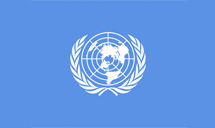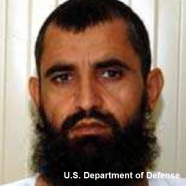Overview
Abdul-Haq Wassiq is a U.N.-sanctioned Taliban senior leader who served as the deputy director general of intelligence during the Talian’s first takeover of Afghanistan from 1996 until 2001. Wassiq was in charge of directing domestic investigations, overseeing all of the Taliban’s activities in Kabul as they related to Osama bin Laden, maintaining relations with al-Qaeda-affiliated foreign fighters, and overseeing al-Qaeda’s training camps.“Narrative Summaries of Reasons for Listing: TAi.082ABDUL-HAQ WASSIQ,” U.N. Security Council, January 31, 2001, https://www.un.org/sc/suborg/en/sanctions/1988/materials/summaries/individual/abdul-haq-wassiq;
“Report on the Inquiry into: The Department of Defense’s May 2014 Transfer to Qatar of five law-of-war detainees in connection with the recovery of a captive U.S. soldier,” Committee on Armed Services, December 9, 2015, 2, https://armedservices.house.gov/sites/republicans.armedservices.house.gov/files/wysiwyg_uploaded/Report%20on%20the%20Inquiry%20into%20the%20Taliban%20Five%20Transfer_0.pdf. Wassiq was captured by U.S. forces in November 2001 and detained in the U.S. Guantanamo Bay detention center from January 2002 to May 2014.“Narrative Summaries of Reasons for Listing: TAi.082ABDUL-HAQ WASSIQ,” U.N. Security Council, January 31, 2001, 3, https://www.un.org/sc/suborg/en/sanctions/1988/materials/summaries/individual/abdul-haq-wassiq. He was one of five Taliban senior leaders transferred to Qatar as part of the Qatar-mediated exchange for captive U.S. Sgt. Bowe Bergdahl.“Report on the Inquiry into: The Department of Defense’s May 2014 Transfer to Qatar of five law-of-war detainees in connection with the recovery of a captive U.S. soldier,” Committee on Armed Services, December 9, 2015, https://armedservices.house.gov/sites/republicans.armedservices.house.gov/files/wysiwyg_uploaded/Report%20on%20the%20Inquiry%20into%20the%20Taliban%20Five%20Transfer_0.pdf. Following the Taliban’s takeover of Afghanistan’s government on August 15, 2021, Wassiq was named the intelligence chief of the Taliban government on September 7.Douglas Schorzman, “Who Are the Taliban’s New Government Leaders? Here’s What We Know,” New York Times, September 7, 2021, https://www.nytimes.com/article/taliban-leaders-afghanistan.html?action=click&module=RelatedLinks&pgtype=Article.
According to a December 2015 report by the Committee on Armed Services, Wassiq had “many contacts with other high ranking Taliban officials,” including former Taliban emir (leader) Mullah Omar.“Report on the Inquiry into: The Department of Defense’s May 2014 Transfer to Qatar of five law-of-war detainees in connection with the recovery of a captive U.S. soldier,” Committee on Armed Services, December 9, 2015, 2, https://armedservices.house.gov/sites/republicans.armedservices.house.gov/files/wysiwyg_uploaded/Report%20on%20the%20Inquiry%20into%20the%20Taliban%20Five%20Transfer_0.pdf. The U.S. National Intelligence Council said that Wassiq has not historically wielded considerable influence in the Taliban but was nonetheless considered a “capable and trusted Taliban official.”“Report on the Inquiry into: The Department of Defense’s May 2014 Transfer to Qatar of five law-of-war detainees in connection with the recovery of a captive U.S. soldier,” Committee on Armed Services, December 9, 2015, 2, https://armedservices.house.gov/sites/republicans.armedservices.house.gov/files/wysiwyg_uploaded/Report%20on%20the%20Inquiry%20into%20the%20Taliban%20Five%20Transfer_0.pdf.
On May 31, 2014, Wassiq was transferred from the U.S. detention center in Guantanamo Bay to Qatar alongside four other Taliban detainees. The move came as part of a negotiated exchange for the release of U.S. captive soldier Sgt. Bowe Bergdahl. At the time of the their transfer, the so-called Taliban Five—including Wassiq—were considered to be sufficiently dangerous as to require them to remain in detention.“Report on the Inquiry into: The Department of Defense’s May 2014 Transfer to Qatar of five law-of-war detainees in connection with the recovery of a captive U.S. soldier,” Committee on Armed Services, December 9, 2015, https://armedservices.house.gov/sites/republicans.armedservices.house.gov/files/wysiwyg_uploaded/Report%20on%20the%20Inquiry%20into%20the%20Taliban%20Five%20Transfer_0.pdf. Although the Memorandum of Understanding (MOU) between the United States and Qatar was classified regarding the terms for Taliban detainees released to Qatar, the U.S. Armed Forces Committee was able to note that the MOU specified “monitoring” efforts to be undertaken by Qatar, as well as the prohibition against detainees’ “travel outside Qatar,” “engaging in conduct that will raise money for prohibited causes,” and “threatening American interests.”“Report on the Inquiry into: The Department of Defense’s May 2014 Transfer to Qatar of five law-of-war detainees in connection with the recovery of a captive U.S. soldier,” Committee on Armed Services, December 9, 2015, 76, https://armedservices.house.gov/sites/republicans.armedservices.house.gov/files/wysiwyg_uploaded/Report%20on%20the%20Inquiry%20into%20the%20Taliban%20Five%20Transfer_0.pdf.
The U.S. Committee on Armed Services determined in December 2015 that members of the Taliban Five have been engaged in “threatening activities” since their transfer to Qatar “not unlike their activities before they were detained on the battlefield.”“Report on the Inquiry into: The Department of Defense’s May 2014 Transfer to Qatar of five law-of-war detainees in connection with the recovery of a captive U.S. soldier,” Committee on Armed Services, December 9, 2015, https://armedservices.house.gov/sites/republicans.armedservices.house.gov/files/wysiwyg_uploaded/Report%20on%20the%20Inquiry%20into%20the%20Taliban%20Five%20Transfer_0.pdf. In January 2015, the U.S. Pentagon said that there was reason to believe that “at least one” member of the Taliban Five was involved in “some activities… centered around potential reengagement.” In March 2015, a news outlet reported that “at least three of the five Taliban leaders… have tried to plug back into their old terror networks.”“Report on the Inquiry into: The Department of Defense’s May 2014 Transfer to Qatar of five law-of-war detainees in connection with the recovery of a captive U.S. soldier,” Committee on Armed Services, December 9, 2015, 75, https://armedservices.house.gov/sites/republicans.armedservices.house.gov/files/wysiwyg_uploaded/Report%20on%20the%20Inquiry%20into%20the%20Taliban%20Five%20Transfer_0.pdf.
As of 2015, Taliban leaders were reportedly living in an exclusive neighborhood in suburban Doha, receiving luxury SUVs, free medical care, air-conditioned homes “the size of small castles,” and fresh produce delivered daily to their homes, according to a report by Newsweek journalist Sami Yousafzai.Sami Yousafzai, “Taliban Leaders Are Living in Luxury in Qatar,” Newsweek, March 24, 2015, http://www.newsweek.com/2015/04/03/taliban-leaders-are-living-luxury-qatar-316122.html.
In 2019, the Taliban began peace negotiations with the U.S. and Afghan government in order to end the 17 year-long war. Crucial issues included the withdrawal of American troops, and a commitment that Afghan soil would not again be used to launch terrorist attacks against the United States and its allies. Wassiq, along with four other past Guantanamo detainees, was part of the Taliban negotiating team discussing the terms of American troop withdrawal from Afghanistan.Mujib Mashal, “Once jailed in Guantanamo, 5 Taliban Now Face U.S. at Peace Talks,” New York Times, March 26, 2019, https://www.nytimes.com/2019/03/26/world/asia/taliban-guantanamo-afghanistan-peace-talks.html.
On August 6, 2021, the Taliban began an offensive against major Afghan cities with the seizure of Zaranj, capital of Nimruz province.Susannah George and Ezzatullah Mehrdad, “Taliban fighters overrun an Afghan provincial capital for the first time since withdrawal of foreign forces,” Washington Post, August 6, 2021, https://www.washingtonpost.com/world/2021/08/06/afghanistan-taliban-nimruz/. By August 13, the Taliban controlled 17 of Afghanistan’s 34 provincial capitals and more than two-thirds of the country.Rahim Faiez, and Joseph Krauss, “Taliban sweep across Afghanistan’s south; take 4 more cities,” Associated Press, August 13, 2021, https://apnews.com/article/middle-east-taliban-c6c8d4a41c554f36031a8131538d1402. On August 15, Afghan President Ashraf Ghani fled Afghanistan and thousands of Afghans poured into Kabul’s airport as Taliban fighters entered the city. By August 16, the Taliban laid siege to the presidential palace and took complete control of Kabul, after which the Taliban declared the war in Afghanistan had ended.“Taliban declares ‘war is over’ as president and diplomats flee Kabul,” Reuters, August 15, 2021, https://www.reuters.com/world/asia-pacific/talibans-rapid-advance-across-afghanistan-2021-08-10/. The Taliban has claimed that it would take on a more “moderate” approach in their ruling of the country, and that women are allowed to have roles in public life in observance of “Islamic law.”“Factbox: Taliban seek to present a moderate face as they take control in Afghanistan,” Reuters, August 15, 2021, https://www.reuters.com/world/asia-pacific/taliban-seek-present-moderate-face-they-take-control-afghanistan-2021-08-15/.
On September 7, 2021, the Taliban announced the official appointments within their caretaker government. Wassiq was named intelligence chief. The government is exclusively male, with many positions filled with veterans from their hardline movement in the early nineties.Matthieu Aikins and Jim Huylebroek, “Taliban Appoint Stalwarts to Top Government Posts,” New York Times, September 7, 2021, https://www.nytimes.com/2021/09/07/world/asia/taliban-women-protest-kabul-afghanistan.html; Kathy Gannon, “Taliban form all-male Afghan government of old guard members,” Associated Press, September 8, 2021, https://apnews.com/article/middle-east-pakistan-afghanistan-arrests-islamabad-d50b1b490d27d32eb20cc11b77c12c87.
Associated Groups
- Extremist entity
- Taliban
- Read Threat Report
- Type(s) of Organization:
- Insurgent, regional, terrorist, transnational, violent
- Ideologies and Affiliations:
- Deobandi, Islamist, jihadist, Pashtun, Salafi, Sunni, Wahhabi
- Position(s):
- Intelligence chief of the Taliban government
The Taliban seized power in Afghanistan in August 2021 after previously leading a violent insurgency in Afghanistan and Pakistan. The group is closely affiliated with al-Qaeda.
History
United Nations
 January 31, 2001
January 31, 2001The United Nations sanctioned Abdul-Haq Wassiq as an individual associated with the Taliban.“Narrative Summaries of Reasons for Listing: TAi.082 ABDUL-HAQ WASSIQ,” U.N. Security Council, January 31, 2001, https://www.un.org/sc/suborg/en/sanctions/1988/materials/summaries/individual/abdul-haq-wassiq.
